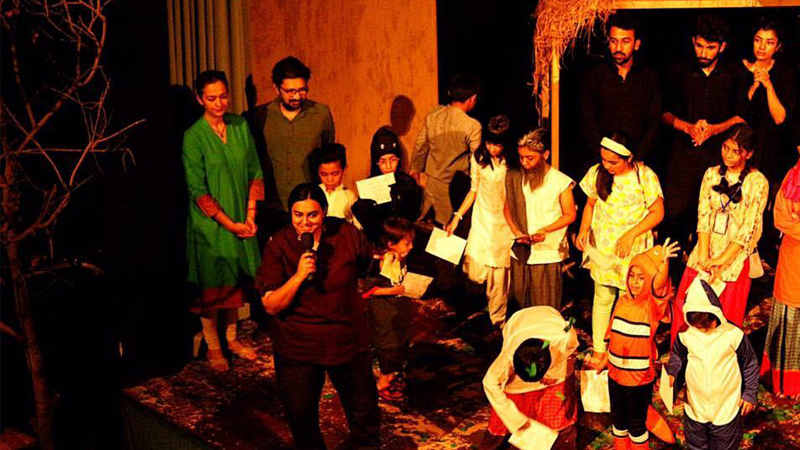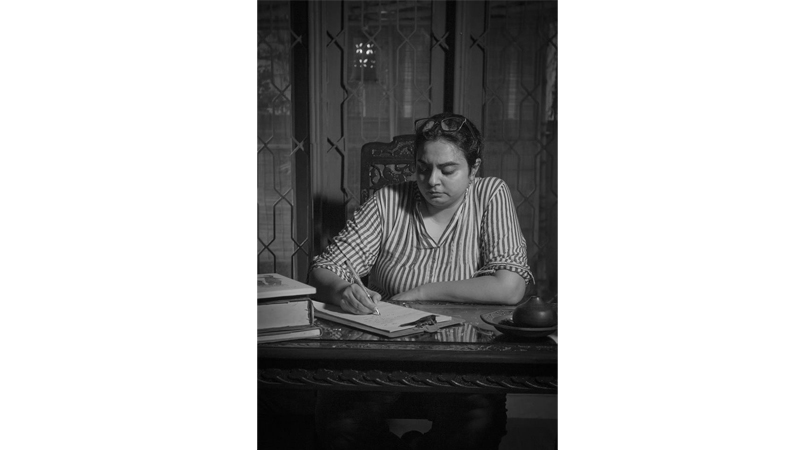 Kanwal Khoosat is one of the creative minds behind Olomopolo, the media company that brings theater performances, stand-up comedy, readings and much more to live audiences across Pakistan. The company celebrated its fifth birthday recently and Kanwal Khoosat sat with Daily Times for a quick interview.
Kanwal Khoosat is one of the creative minds behind Olomopolo, the media company that brings theater performances, stand-up comedy, readings and much more to live audiences across Pakistan. The company celebrated its fifth birthday recently and Kanwal Khoosat sat with Daily Times for a quick interview.
Khoosat originally directed TV plays and sit-coms like ‘Mujhe Apna Naam-o-Nishan Milay’,’ Cheekoo’, ‘Papa Aur Woh’ and ‘Aao Kahani Buntay Hain’.
Actor Irfan Khoosat is her father and Sarmad Khoosat is her brother – so this talent obviously runs in the family.
However, she stands out because of her love for stage performances. She admits theatre is her first love.
“This was roughly let’s say five and a half years ago, we had thought of doing a theatre festival,” she says “It was a fancy idea and then we kept developing it. By the way, we were doing commercial theatre for the first time after out college plays and smaller stunts. We could not pull that festival off. It was huge and we needed a lot of sponsors. We knew how to do theatre even then but we were very poor in marketing. That couldn’t come about but we were all friends. We were very excited and people liked the idea very much too but when the materialising it and sponsoring it financially was not successful. We had worked on it for five months. We brought many friends together for it.”
“Our basic idea was that we want to do theatre again and the kind of theatre we want to watch ourselves.”
The festival was named Weekend Theatre Festival or in short – WTF.
“We didn’t do the festival but we formed this core group of people who love theatre and we can do solo productions,” says Kanwal. “The idea was to revamp weekend activity in Lahore. The film was still budding, and there was hardly one or so release every year. There was no entertainment for your weekends out. We have all grown up watching theatre. Lahore had a huge boom of theatre, along with film and TV. We were growing up, and we saw that film ended, TV moved away from Lahore and became Karachi-centric. Our own family production house was shut down. The theatre was left to a niche class that was and still isn’t liked by many.”
Olomopolo has presented some sterling theatre and other forms of stage performances like readings, stand-up comedy and even film screenings. As Kanwal says, they really do “push the envelope” when it comes to the content, style and even the genre.
She says that she is particularly fond of the readings that Olomopolo organises.
“Everything we enjoyed watching and doing became tabooed and then finished,” says Kanwal. “Our basic idea was that we want to do theatre again and the kind of theatre we want to watch ourselves. Gradually we grew and our growth has been very organic.”
 Olo, as the organisation is lovingly referred to, organised a tripartite reading on its fifth birthday. Sarmad Khoosat, Tajdar Zaidi and Irfan Khoosat read short stories, poems, and letters of the likes of Faiz, Gulzar and Noon Meem Rashid. The reading was held at the performance room in Olomopolo’s office which is called the Olo Junction. The audience was mesmerised, and this became their first introduction to some of the authors.
Olo, as the organisation is lovingly referred to, organised a tripartite reading on its fifth birthday. Sarmad Khoosat, Tajdar Zaidi and Irfan Khoosat read short stories, poems, and letters of the likes of Faiz, Gulzar and Noon Meem Rashid. The reading was held at the performance room in Olomopolo’s office which is called the Olo Junction. The audience was mesmerised, and this became their first introduction to some of the authors.
Another example is the recently organised ‘Likhe Ju Khat Tujhay’ which included a string of literary letters written by different authors in Urdu. Sania Saeed and Tajdar Zaidi read the letters. The reading has been organised for years now and taken to various cities across Pakistan. The event was ticketed and sold out days before the date.
“We have not just done performance theatre,” says Kanwal. “We have done dramatic readings and in the past five years all over Pakistan. We have made different formats apart from the genre itself. We celebrate that genre a lot. It is feasible. The second thing is that we decided not to keep it basic. We didn’t want a black set and a man on the podium giving an amazing reading.”
Olomopolo has presented some sterling theater and other forms of stage performances like readings, stand-up comedy and even film screenings. As Kanwal says, they really do “push the envelope” when it comes to the content, style and even the genre
Kanwal believes that Olo has taken the genre of readings forward. She mentions ‘Absolute Manto’, ‘Likhe ju Khat Tujhay’ and ‘Dastaangoi’. Also, ‘Aik Shab Bnaam e Urdu Adab’ which was dramatic readings of letters by prisoners on death row. “We have brought a set, costumes, lighting, background score and music to our readings,” says Kanwal.
Although every Olo event is worth attending – the piece de resistance are the plays. They usually do one or two significant theatre productions a year. These plays include ‘Teesri Dhun’ which revolves around the third gender, ‘Lorilei’ which deals with a mother’s trauma of losing her child, ‘Mushk’ which brings two forlorn lovers of the same man together in the loss, ‘Jhanjhar Di Pawan Chankaar’ which is a reflection on a blind man’s sexuality and struggle for independence.
“We always make a point to think through a production seriously even if it is for children or youth,” says Kanwal.
“So the programs made for the children are not the children’s’ job. The programs for youth shouldn’t be done thoughtlessly. Everything needs very serious focus, input and a lot of serious effort. All of us have a keen interest in the fact that whatever we are saying has to have substance and it has to be presented in a very aesthetically well manner. “
The Olo productions are visually gratifying as well. The audience is mesmerised by the set much before the performances. There are often bookshelves, staircases, windows, kitchens and seating arrangements that stun the viewer with their beauty and balance.
“You see, theatre is not the radio,” Kanwal explain. “So it is as much a visual medium as film and TV are. It has to be a well-presented production. So content is our prime concern. We don’t want to be existential. We don’t want to say the actor will carry the whole production. Everything can communicate. It is up to you to only use the actor. We have done those productions too. “
This summer, Olo also managed a Punjabi play called ‘Jeebo Jani ki Kahani’ which was performed solely by children. The play was staged twice and attracted a vast audience, which was surprising considering that there were no stars, but rather children performing.
Olo prioritises children, believes in training them through summer camps and providing them quality entertainment through carefully planned performances.
But who gets to have the final word on the production?
 “Like any production company and hierarchy it is always the director who gets to have the final word,” says Kanwal. “We keep rotating the hats for direction while others do the workshops or projects. We try and keep it democratic. We take the opinion from everyone because all of us have the background of production. And none of us has studied theatre. We have just experience in theatre. The length and breadth of our experience also vary. Again we respect the hierarchy also. That if someone is directing, then he or she has to have the final word. Too many cooks spoil the broth, and we don’t do that to our production. We have our disagreements also. Sometimes we handle it amicably and sometimes not so amicably, but then again that’s how the creative process works, and I think that is very important for anyone to evolve individually also. If everyone is on the same page, that means there is no learning curve.”
“Like any production company and hierarchy it is always the director who gets to have the final word,” says Kanwal. “We keep rotating the hats for direction while others do the workshops or projects. We try and keep it democratic. We take the opinion from everyone because all of us have the background of production. And none of us has studied theatre. We have just experience in theatre. The length and breadth of our experience also vary. Again we respect the hierarchy also. That if someone is directing, then he or she has to have the final word. Too many cooks spoil the broth, and we don’t do that to our production. We have our disagreements also. Sometimes we handle it amicably and sometimes not so amicably, but then again that’s how the creative process works, and I think that is very important for anyone to evolve individually also. If everyone is on the same page, that means there is no learning curve.”
In the coming days, Olomopolo is due to organise several events. The most prominent one is #NoTimetoSleep, a digital live performance, #SarmadKhoosat will play a death row for a full 24 hours. There is a roast of Imran Khan in his absence, a training workshop on “improv” (a theatre technique) by the Minnesota-return Jim Robinson and a Performance Art exhibition. You really must follow their Facebook page to keep tabs on their work. All these events are highly recommended.
The writer is based in Lahore and tweets as @ammarwrites. Her work is available onwww.ammaraahmad.com
Published in Daily Times, September 5th 2018.